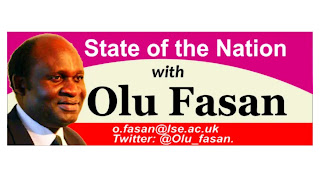The selection of a Muslim-Muslim ticket by Alhaji Bola Ahmed Tinubu, the All Progressives Congress, APC presidential candidate, must continue to infuriate every decent Nigerian. The blatant insensitivity and nefariousness of the deliberate action that denigrates Christianity and puts religious harmony and internal cohesiveness in Nigeria at greater risk should appal every patriotic Nigerian. Of course, we will continue to address this matter until the elections of next year. Here, I'm concentrating on the choice's symbolism.
Some have distorted the opposition to the Muslim-Muslim ticket out of self-interest. Festus Keyamo, a spokesman for the Tinubu presidential campaign and a minister of state for labour and employment, recently stated that it was about "balance of power." He claimed that if Kashim Shettima, a fellow Muslim, were to succeed Tinubu as president and vice president, Christians would dread losing influence at the centre. Because the vice president "is powerless," he said that this was a mistake.
Yet Keyamo is mistaken. The issue is not one of power relations. Everyone is aware that there is no duopoly in the Nigerian presidency and that the head of state has absolute power. However, a president cannot exist without a vice president. Thus, the issue at hand is one of inclusion and representation, namely whether it is appropriate to elect a presidential ticket that shares the same religion in a nation where Christians and Muslims together make up almost 50% of the population.
Still on the subject of the vice president's "powerlessness," some have asserted that a vice president who is a Christian is unable to stop the persecution of Christians. Even though Vice President Yemi Osinbajo is a pastor, they reminded us that over the previous seven years, Christians have been subjected to unrelenting persecution. So what value does a vice president who is Christian have?
Well, they're also mistaken. Yes, a vice president who is a Christian won't eliminate persecution of Christians, but consider what would happen if a Muslim-Muslim was in office. Anyone have any information on the number of private interventions Vice President Osinbajo made to Christian leaders to ease tension? Can anyone measure how much the Christian community's tension was reduced by his presence at the centre? It's really difficult to think that Nigeria, which has been led by a Muslim-Muslim for seven years, managed to avoid a more serious conflagration. An effective analysis considers counterfactuals!
But those are just tangents. The significance of the Muslim-Muslim ticket is my main area of interest. Let's use the 1999 Constitution as the context. "Sovereignty belongs to the people of Nigeria," states Section 14(2)(a), "from whom government derives all its rights and authority." The composition of the Government of the Federation "must be carried out in such a manner as to reflect the necessity to command national loyalty and to promote national unity," Section 14(3) continues.
The Federal Government, the embodiment and seat of Nigerian sovereignty, is obviously required by the text and spirit of those laws to be inclusive and representational in order to "advance national unity" and "demand national allegiance." So now for the main point. Given that Christians make up over 100 million of Nigeria's population, or close to 50%, how would their absence from either of the two offices of president or vice president—which together reflect Nigeria's sovereignty and compel national loyalty—strengthen national unity?


Post a Comment
Add your comments here